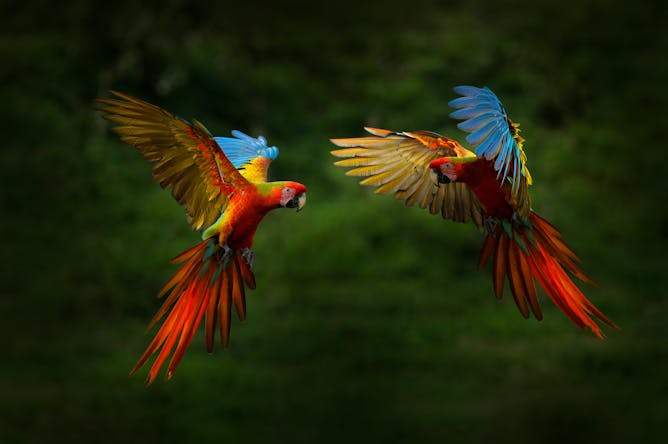|
|
|
|
Good news for pessimists: the pandemic is our time to shine. While optimists usually enjoy the various health benefits that come from looking on the bright side, their sunny disposition can be dangerous during the outbreak of a deadly airborne virus. Christian van Nieuwerburgh,a self-confessed optimist and expert in positive psychology, explains why glass-half-full types need to rein in their inherent belief that things will go well, and act
like it’s probable they’ll catch COVID-19.
Back in spring, when much of the world ground to a halt due to the spread of coronavirus, it seemed as though our mass inaction might lead to a change in global temperatures. Two atmospheric scientists explain why that didn’t happen.
And a reminder that our series, Curious Kids, gives children the chance to ask an academic expert a burning question they have about the world. In the latest instalment, an expert in evolution explains how
birds evolved wings. You can submit your own queries by emailing curiouskids@theconversation.com.
|
Megan Clement
Commissioning Editor, COVID-19
|

|
|

microstock3D/Shutterstock
Christian van Nieuwerburgh, University of East London
Optimists often assume that bad things won't befall them – a dangerous outlook during the coronavirus pandemic.
|

Sugrit Jiranarak/Shutterstock
Scott Archer-Nicholls, University of Cambridge; James Weber, University of Cambridge
Some atmospheric pollutants actually help cool the planet, but the sudden shutdown of heavy industry threatened to purge them.
|

Hybrid parrots in Costa Rica.
Ondrej Prosicky/Shutterstock
Matthew Wills, University of Bath
Today's birds evolved from feathered dinosaurs.
|
Science + Technology
|
-
Pascal Vrticka, University of Essex; Philip J. Cozzolino, University of Essex
Recent findings from social neuroscience show us how we can make virtual interactions almost as beneficial as real world ones.
-
Andreea Font, Liverpool John Moores University
A new method suggests we should aim to detect dark matter haloes by tracing galactic gas.
|
|
Business + Economy
|
-
Paul Michael Greenhalgh, Northumbria University, Newcastle
A space the size of 284 Bluewaters is surplus to requirements.
-
Sascha L. Schmidt, WHU – Otto Beisheim School of Management; Florian Holzmayer, WHU – Otto Beisheim School of Management; Johannes Fühner, WHU – Otto Beisheim School of Management
Diversification into related businesses can provide a firmer financial footing.
|
|
Politics + Society
|
-
Rodger A. Payne, University of Louisville; Kurt Mills, University of Dundee
The Trump administration's overt transgressions of international norms embolden other world leaders to violate human rights.
-
Cristian Vaccari, Loughborough University
The future of democracy could depend on how the forthcoming election plays out – so the way in which it is covered will be crucial.
|
|
Health + Medicine
|
-
Gordon Dent, Keele University
There's still a lot of uncertainty, but the picture is gradually getting clearer – here's what we know so far.
|
|
Cities
|
-
Amy Barnes, University of Sheffield; Maria Val Martin, University of Sheffield
School streets close roads to motor traffic when children arrive at and leave school.
|
|
Arts + Culture
|
-
Alison Baker, University of East London
Here are some books that will make reading time more enjoyable for children and the adults reading to or with them.
|
|
Environment + Energy
|
-
Alexandru Gociu, Trinity College Dublin; Suryapratim Roy, Trinity College Dublin
Landmark case highlights the conflict between immediate climate action and a gradual transition to renewables.
|
|
| |
Featured events
|

|
Online, Leeds, Leeds, LS2 9HD, United Kingdom of Great Britain and Northern Ireland — University of Leeds
|

|
Swansea University , Singleton Park, Swansea, Swansea [Abertawe GB-ATA], SA3 3DX, United Kingdom of Great Britain and Northern Ireland — Swansea University
|

|
Sustainable Places Research Institute, Cardiff University, Cardiff, Cardiff [Caerdydd GB-CRD], CF10 3BA, United Kingdom of Great Britain and Northern Ireland — Cardiff University
|

|
East Road, Cambridge, Cambridgeshire, CB11PT, United Kingdom of Great Britain and Northern Ireland — Anglia Ruskin University
|
|
|
|
| |
| |
| |
| |
| |
|
|
|
|
|
|
|